Post-traumatic stress disorder: How Brisbane mother Ali France overcame it
WHEN a car ploughed into Ali France her life changed forever. After suffering severe PTSD, she found new purpose through sport and now politics – as Labor’s candidate to take on Peter Dutton at the next Federal Election.
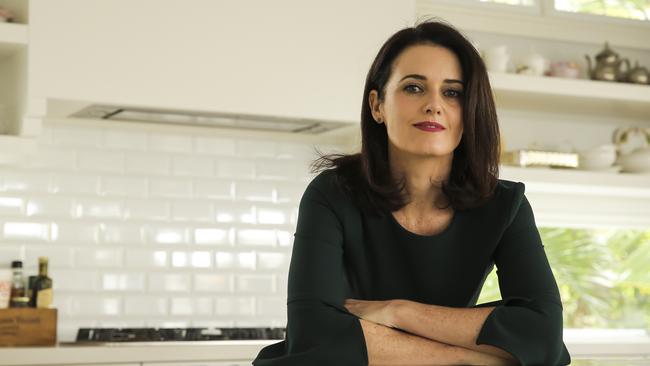
QLD News
Don't miss out on the headlines from QLD News. Followed categories will be added to My News.
THIS MOVING and emotional feature on a disability advocate and motivational speaker was an extremely popular cover story of The Courier-Mail’s QWeekend Magazine back in June, 2017.
We thought it timely to resurface the piece because the brave and inspirational subject of this profile is none other than former journalist Ali France – who will be Labor’s candidate to take on Peter Dutton in the seat of Dickson at the Federal Election. Enjoy!
MY femoral artery was severed and as soon as the car backed off my leg the blood poured out of me. It was a tsunami of blood. I still felt no pain; the only thing in my head was my son. Where was he? Was he OK? Was he dead?
Ali France has written the memories down. It’s been six years since the accident that wrenched away her life as she knew it. Six years since an innocuous trip to do midweek errands at the local shops with her then four-year-old son turned into the most nightmarish of scenes. She has recorded her memories for the first time.
France has never spoken in detail about the accident in May 2011 that led to her coming within a whisker of death when a car slammed into her in a shopping centre carpark and how her worst fear – of losing a child – came chillingly close. For most of the past six years, France, who had her left leg amputated above the knee in an emergency, lifesaving operation, has been consumed by debilitating post-traumatic stress disorder, a crippling “fear of everything”, multiple surgeries, as well as relentless, intense pain.
But France, a former journalist and television producer, is finally getting her life back on track. She has recently returned to the paid workforce, has found an unexpected future in elite sport, and is finding her voice again through the written word.
From her home in Ashgrove, in Brisbane’s inner northwest, France, 44, says she still finds the memories difficult.
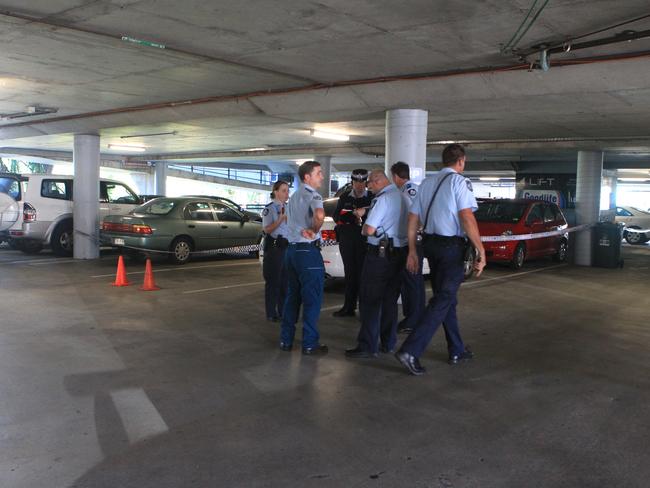
“Only my family have known about the details of the accident,” she says. “It just takes my breath away … nobody realises that it wasn’t so much that I lost my leg, it was my worst fear of nearly losing a child that was the biggest issue for me. What a lot of people don’t know is, while I tried to push Zac out of the way, I didn’t succeed and he ended up under the car. He was very, very lucky.”
The accident happened as France walked, with Zac in his stroller, towards a lift in the undercover carpark of the small Highpoint Shopping Plaza on Waterworks Road, a major Ashgrove thoroughfare.
France heard the “ear-splitting roar” of a revving car and turned to see a vehicle headed straight for them. In the split second before impact, she tried to push Zac and his stroller out of the way. France took the full impact of the car and was pinned between the still-revving car and another empty, parked vehicle.
The horror of the situation was immediate. With smoke coming off the car tyres, which were still turning, and from under the bonnet, France was eyeballing the driver, an 88-year-old man who was staring at her in shock, his mouth agape. His hands were firmly on the steering wheel and his foot was pressed down on the accelerator.
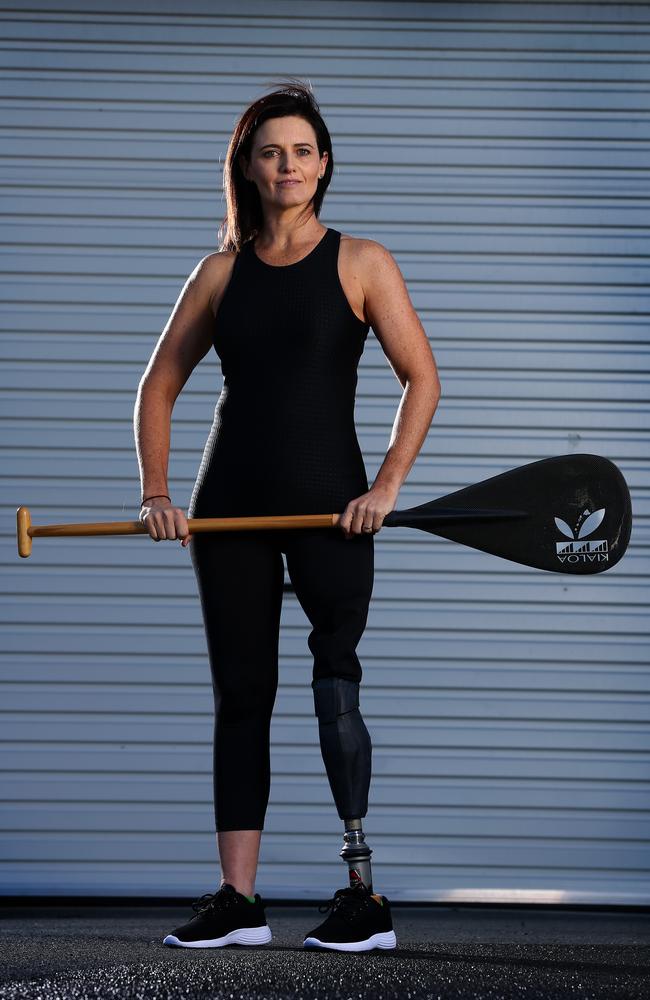
But worse, France could no longer see Zac. She feared he was under the car and, panic-stricken, she started screaming at the driver to get the car off her.
“At the time I was completely awake, this car was pinned on me and the driver, who was elderly, was frozen,” France says. “The driver just stared at me. There was smoke everywhere, the engine was revving and I was just screaming, ‘Get the car off me, get the car off me!’ I was screaming for Zac. I wanted the car off me because of Zac, not because I was hurt.
“My leg didn’t even really feature in those moments, and even when I was in hospital. I subsequently suffered really terrible post-traumatic stress disorder … but it wasn’t to do with me losing my leg, it was to do with nearly losing my child.” Zac, now 10, suffered a deep burn to his leg from the car tyres but, incredibly, was otherwise unharmed. France later found out that he was dragged to safety from under the car by a 17-year-old mother with a baby strapped to her front, who had stepped out of the lift as the drama was unfolding.
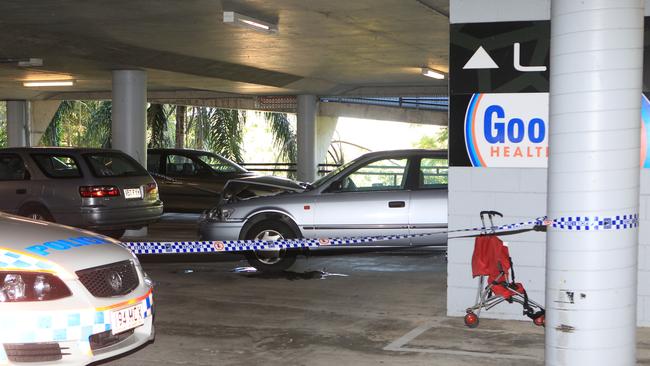
The woman, believing she was witnessing someone deliberately trying to kill France, put her own baby on the ground, reached under the car, pulled Zac and the stroller out and took him upstairs to a cafe to remove him from harm’s way.
France was then saved by two young men who reached over the elderly driver to put the car in neutral and then physically pushed the vehicle off her.
But the real battle for France’s life had only begun. With her femoral artery severed, she began bleeding out. Her life was in the balance. “It was unbelievable how much blood there was,” France says. “I went to take a step and there was nothing underneath me and I fell to the ground. At that point, I didn’t feel any pain. I didn’t realise what had happened to me.
“One of those young men took his shirt off and tourniqueted my leg and saved my life. When your femoral artery is severed, you lose consciousness within 30 seconds and you can die within four minutes – before an ambulance has any time to get to you.
“Those two young men saved me. It was complete luck they were there. I lost consciousness very quickly. My last words I remember were, ‘Zac, Zac …’ ”
I was as close to death as a person can be that day. They took off my leg without anaesthetic or pain relief. There was no time … it was take it off now or die.
France has undergone six surgeries to her leg over five years. Most dramatically, under life-threatening circumstances, doctors – who had initially tried to save the crushed limb – were forced to perform an emergency amputation without anaesthetic. France, who was unconscious, doesn’t recall any pain. Afterwards, doctors told her she was at death’s door.
When she woke in intensive care days later, France’s first thoughts were of Zac. With an intubator down her throat, she spelt out the letters “Z-A-C” on her husband Clive’s hand. He reassured her their son was fine.
Far from grieving the loss of her leg, France says she was buoyant. Her worst fears had not been realised. Zac was alive and she felt like she had “won the lottery”.
“My leg didn’t even feature. It didn’t matter to me,” France says. “I never cried in hospital. The whole amputation thing wasn’t a big deal because I didn’t lose Zac. I had an overarching relief that he’d come away unscathed. I just felt so grateful. I joked I would go to a leg shop and buy a new one. I had no idea what was ahead of me.”
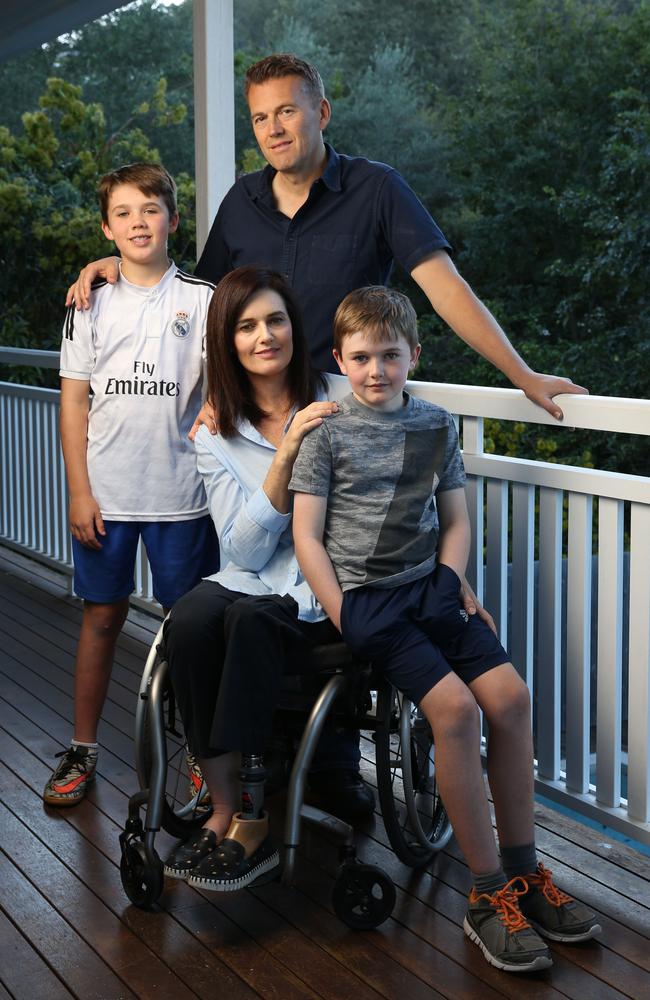
France’s amputation, without time for proper planning, was not straightforward. The next seven months, she says, passed “in a blur’’ with daily dressings required and “serious amounts of medication”. Her mum, Lin Cullinan, now 67, gave up work as a tennis coach on the Gold Coast and during the week she lived with France and her husband Clive, 48, an app developer, to look after Zac and older brother Henry, now 12. France’s father, former Labor state racing minister Peter Lawlor, 69, drove her to appointments and still spends three days a week helping out.
After initially entertaining visitors in her home and even holding a work meeting on her back deck, France says her world came crashing down as the symptoms of PTSD set in.
I would see the frozen face of the man who had hit me everywhere – in my dreams, in my house, outside my house. Fear completely engulfed me. Fear became a bigger disability for me than losing my leg.
France didn’t recognise herself. During her career she had worked as a journalist in Brisbane and Hong Kong, had been a senior press officer for the UK’s then Healthcare Commission and a television producer for Brisbane-based Carbon Media. In 2010, she had success writing and producing a one-hour documentary, ProppaNOW, for ABC TV, about an indigenous artists’ group.
France had enjoyed her work and had considered herself a confident, fearless person; but then all aspects of her life changed. About two months after the accident, panic attacks and visions of the elderly driver took hold.
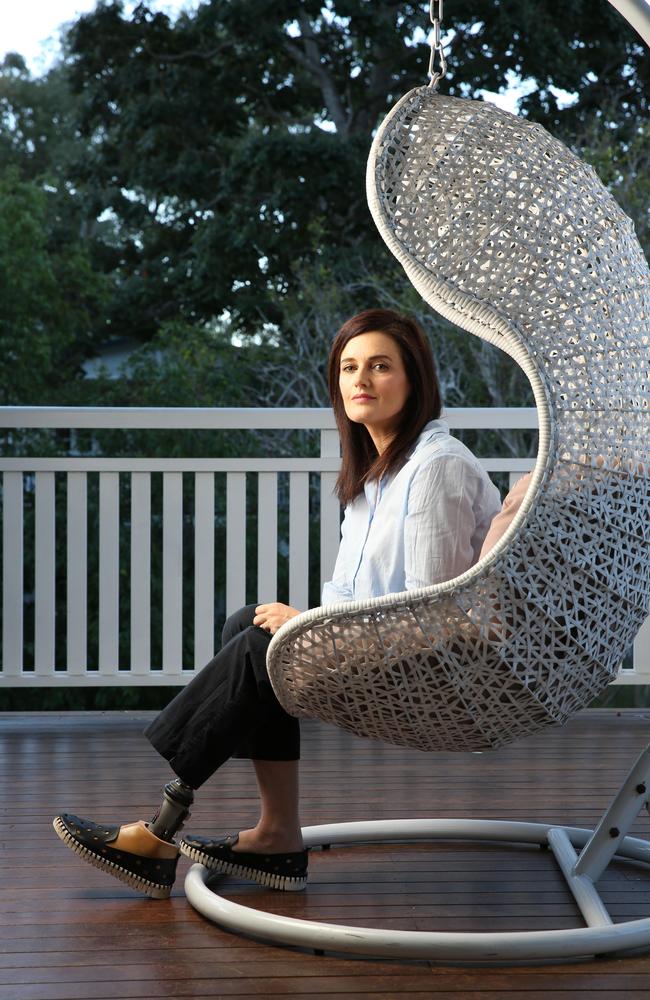
Fears engulfed her – fear of never walking again, of leaving her house, driving a car, the way she looked, writing, being asked about the accident, hospital, being alone with her children, not being able to look after her children, and of all social situations. She suffered chronic chest pains and difficulty breathing. For years, she was haunted by visions of the driver’s face.
France didn’t drive for three years. She also stopped writing because she simply stopped knowing what to say. “I feared absolutely everything,” she says. “When I went out I would stumble, I became shaky, I would forget how to speak. I even feared myself – the person I no longer knew at all. I felt completely lost. It wasn’t just about losing my leg, it was losing who I was.”
One of her greatest fears was pain. From the beginning, France experienced severe “phantom pain” – pain she still experiences in the leg she no longer has.
“The pain was just out of this world and I feared pain more than I feared death,” France says. “Sitting here now I can feel my left leg, even though it is quite obviously not here. The most common phantom pain I experience is like a lightning strike – what I would imagine it would feel like to be electrocuted, except the electrocution could last five minutes or up to 10 hours.”
Walking on a prosthetic proved impossible for France, despite her best efforts. Due to suffering a painful condition called chronic trauma lymphedema, her stump swells, shrinks and retains fluid. A traditional prosthetic socket would simply fall off without warning.
Devastated, France grappled with the idea of never walking again until her father came across an article on a surgical procedure called osseointegration being performed by Sydney-based surgeon Dr Munjed Al Muderis. The cutting-edge technique – in which a titanium rod that connects to a prosthetic is permanently implanted into a patient’s bone – was still in its infancy. In November 2012, France was the 26th patient in Australia to undergo the procedure, with two more surgeries to follow in January 2013 and May 2014.
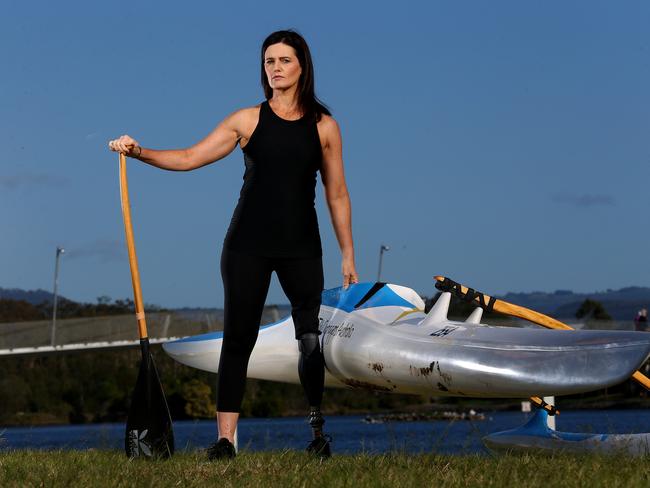
Al Muderis, 45, who pioneered the technique, has now done about 430 of the operations worldwide and regularly teaches visiting overseas surgeons. “This surgery was Ali’s last alternative,” Al Muderis says. “The only other option she had was an archaic traditional socket that she couldn’t mobilise because of pain.
“She was in a wheelchair … she is a mother of two lovely kids, she has a family and needed to move on with her life. She had a great life and a great career and it was all put on hold because of her traumatic accident … it had a major impact on her life.
“In Ali’s case we put the titanium rod into her femur. This part is permanent but the external component is removable so Ali can remove the prosthetic from above her knee.
“I have a great deal of admiration for Ali. The way I look at it is … a disability is a disability of the mind rather than the body. Ali is strong enough to take back her life, move on and excel.”
While the surgery has been a success and has allowed France to walk again, she has undergone further surgery to her leg for infection and lymphedema treatment. Last year, she was unable to walk, on and off, for six months.
Suddenly I had become a world champion. My world opened up. I also got to show my kids that no matter what happens to you in life, you pick yourself up and you keep going.
Sport is perhaps the last place France ever dreamt she would find solace. As someone who hadn’t competed in any sport since age 16, France especially disliked any kind of water-based activity. So to be part of a gold medal-winning, world champion outrigger canoeing team is, she says, astonishing. France was introduced to the Sunshine Coast’s Mooloolaba Outrigger Canoe Club and a No Limits Adaptive Paddling program by bilateral amputee Shona Muckert, who had also undergone osseointegration surgery with Al Muderis. France tentatively gave it a go and to her surprise found a sense of release and something psychologically calming about being on the water. It was her “break from the world” and a way of distracting herself from the constant pain she endured.
“I would never have pegged myself on water of any kind doing any sport,” France says. “When I was in hospital, people would say, ‘you can be in the next Paralympics’. I would go, ‘Are you kidding? I hate sport. That’s not me’. But I’ve learnt you’re never too old to start taking risks. If you are not taking risks, you’re really not living. Sport has given me a lot of confidence and made me step out of my shell, out of my comfort zone and out of my bed. It was a real turning point for me.”
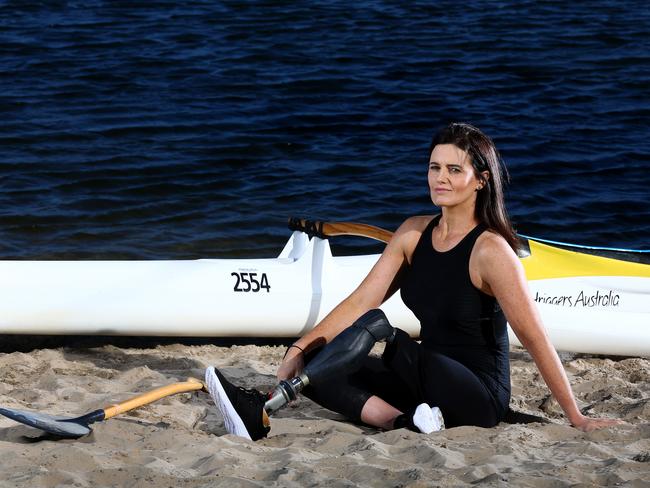
In 2016, nearly five years after her accident, France was asked to join the No Limits Australian outrigging team to compete in the International Va’a Federation (IVF) World Sprint Championships, a move she says felt like “jumping off a cliff”. It was also the impetus she needed to clear her head and wean herself gradually off the “truckload of pain medication” she was taking.
After going to great lengths to get rid of her pain, including the treatment of having a stimulator attached to her spinal cord, France says she finally accepted that sometimes “there’s no cure”. For the past 18 months, she has been free of medication and has accepted ongoing pain as part of her life.
“I wanted to start achieving again and live my life again. I didn’t want to be a zombie for the rest of my life. I just had to confront the fear of pain,” she says. “Pain is still a huge issue and there are nights I don’t sleep at all. But I’ve accepted it as part of my life. I get so many more benefits being off the medication.’’
In May 2016, France competed in three team event sprint races at the world championships at Kawana, on the Sunshine Coast, and won two gold medals and a silver. She has also competed as a solo paddler at the Australian Outrigger Canoe Racing Association (AOCRA) National Outrigger Sprint titles and, in March, raced in Sydney in the Canoe Sprint National Championships, where she placed third. Her next and biggest challenge is an 18km team marathon at the IVF World Distance Championships in Tahiti next week.
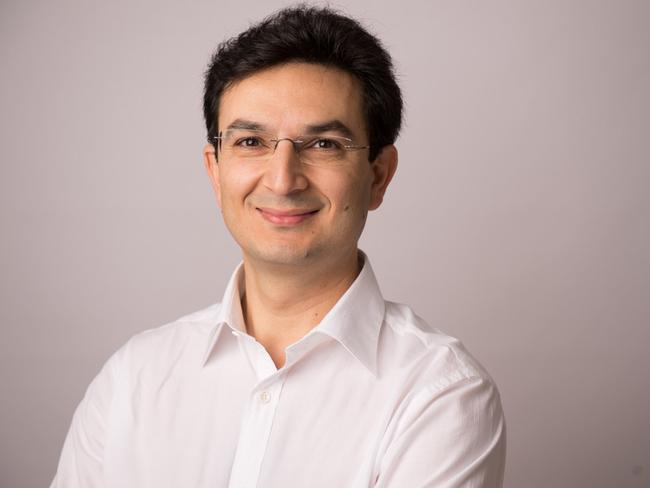
Munjed’s courage had a profound effect on me. He is a masterclass in the power of one voice and he inspired me to start using my voice.
Munjed Al Muderis, an Iraqi-born asylum seeker who obtained his medical degree in Baghdad, arrived on Christmas Island in November 1999, illegally by boat, before he was officially accepted by Australia as a refugee in August 2000. Given all that Al Muderis has contributed and the difference his surgery has made to her life, France was incensed at a Federal Government proposal to amend the Migration Act. It was proposed asylum seekers who tried to come to Australia by boat should be banned from the country for life, including those on tourist or business visas.
In October 2016, she wrote an open letter to Prime Minister Malcolm Turnbull titled “My surgeon, the refugee who came by boat” and posted it on her Twitter account. Within hours, it had been shared all over the world. It has since been shared more than 1100 times.
“I hadn’t written anything for five-and-a-half years,” France says. “I couldn’t bring myself to write about myself. Even at the end of last year I couldn’t verbalise my experience. But Munjed had done so much for me that I belted out a letter to the prime minister. I get really fired up about social justice issues and I was inspired to be like him and use my personal experience to contribute to the debate, not just to hide away at home.”
France, while still “full of self-doubt”, believes she has now overcome her PTSD and returned to work in March in a part-time marketing and communications role with Brisbane-based charity Karuna, which provides in-home palliative care. Her parents remain a constant support, coaching the boys in cricket and tennis, babysitting and helping with grocery shopping and laundry. France says she is also “forever grateful” to Clive, her husband of 13 years, who picked up the pieces of the household and kept it going for many years.
France has not returned to the scene of the accident, nor has she had any contact from the driver or his family. The driver, Ronald Leopold Petfield, a World War II veteran and retired Brisbane City Council tram and bus driver, was disqualified from driving after the accident. He died in 2014, aged 91.
France did, however, meet with the young mother, Megan Crookston, who dragged Zac to safety as well as the two men, Aric Simmonds and Joseph Osborne, who saved her life in the carpark.
After a “very difficult” process, France received an out-of-court compensation settlement about 18 months ago. The future may also bring a career in politics. Since May 2016, France has been a member of Labor Enabled, an association of the Labor Party for people with disabilities to influence and formulate policy. She is now an executive committee member.
France grew up with politics. She spent her childhood handing out how-to-vote cards and doorknocking for her father. Her grandmother, Mary Lawlor, was also heavily involved in politics and a female activist of her time.
“I really enjoy politics,” France says. “Despite this, I never really considered becoming active in politics until after I lost my leg. But there is a dire need for more people with disabilities to get involved in politics … to be heard, we need to be at the decision-making table and that means getting people with disabilities elected to federal and state parliaments. I have enough in my life to keep me busy at the moment but if the opportunity arose, I would be honoured to be a part of that.
“This journey has been rough but it’s also brought a richness to my life that I didn’t have before I lost my leg. I’m confronting fears all the time. There have been many failures but part of not giving up is accepting the failures, picking yourself up and moving on.” ■


